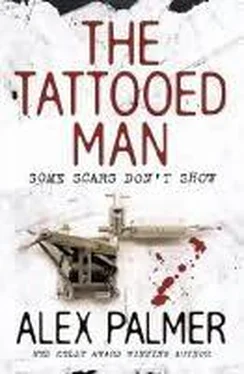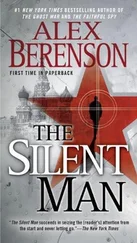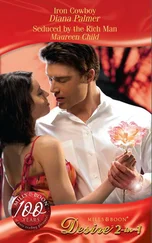Alex Palmer - The Tattooed Man
Здесь есть возможность читать онлайн «Alex Palmer - The Tattooed Man» весь текст электронной книги совершенно бесплатно (целиком полную версию без сокращений). В некоторых случаях можно слушать аудио, скачать через торрент в формате fb2 и присутствует краткое содержание. Год выпуска: 2008, ISBN: 2008, Издательство: Harper Collins, Жанр: Триллер, на английском языке. Описание произведения, (предисловие) а так же отзывы посетителей доступны на портале библиотеки ЛибКат.
- Название:The Tattooed Man
- Автор:
- Издательство:Harper Collins
- Жанр:
- Год:2008
- ISBN:9780732285722
- Рейтинг книги:4 / 5. Голосов: 1
-
Избранное:Добавить в избранное
- Отзывы:
-
Ваша оценка:
- 80
- 1
- 2
- 3
- 4
- 5
The Tattooed Man: краткое содержание, описание и аннотация
Предлагаем к чтению аннотацию, описание, краткое содержание или предисловие (зависит от того, что написал сам автор книги «The Tattooed Man»). Если вы не нашли необходимую информацию о книге — напишите в комментариях, мы постараемся отыскать её.
The Tattooed Man — читать онлайн бесплатно полную книгу (весь текст) целиком
Ниже представлен текст книги, разбитый по страницам. Система сохранения места последней прочитанной страницы, позволяет с удобством читать онлайн бесплатно книгу «The Tattooed Man», без необходимости каждый раз заново искать на чём Вы остановились. Поставьте закладку, и сможете в любой момент перейти на страницу, на которой закончили чтение.
Интервал:
Закладка:
Harold was sitting out on his front veranda having a late morning tea after feeding his stock. As well as its view of the landscape, the front veranda looked directly onto the ruins of the gardens Harold’s mother had cultivated when he was a boy. Once these gardens had bloomed in a profusion of roses and exotic flowers. All that remained of them now was a sundial, stretches of subsiding, antridden paving and stands of well-grown red flowering coral gums, one of the few native plants his mother had liked. They had self-seeded and spread, and were now encroaching into the pepper trees on the south-western side of the house. The other plants were either dead or dying and stood as bare sentinels between the farmhouse and the house paddock. Even if Harold had had the time for a garden, these days there was no water to spare for it.
Rosie was beside him; as usual she sat up and started to bark as soon as she heard the van coming up the track. ‘Quiet, girl,’ he said, and got to his feet. With Rosie trotting after him, he walked down the side of the house to meet the courier. It was cooler here in this broad avenue shaded by the pepper trees. They stretched in a line down to the main yard, forming a barrier against the sun and wind. This avenue had once been intended as a driveway. Now it was partially blocked by the house water tank, which stood as an obstacle to be skirted between the pepper trees and laundry. Harold reached the yard just as the van came bumping into sight over the uneven ground. It was a private firm he’d not heard of before: Everyday Express.
‘Harold Morrissey,’ the courier said. ‘Sign here.’
Harold took the small square parcel into the kitchen and opened it. Nestled on a piece of paper was a set of keys attached to a heavy bronze keyring, a football with Juventus written across it. The last time he had seen these keys, they’d been sitting on the coffee table in his living room; the man called Jerome had picked them up and put them in his pocket. Harold took the piece of paper out of the small box and unfolded it.
Go and see what’s inside your brother’s fence. Take some specimens. Get them tested at a laboratory. Tell the police. Find out what’s really growing on your property.
Harold looked at the parcel again. There was a return address along with a telephone number. He rang it only to hear a recorded message telling him the number he had dialled was not connected. The return address must be equally false. After a few moments’ thought, he searched around for his Stanley knife and a number of plastic bags. Then he picked up his own keys and walked outside, disturbing Rosie where she had settled on her blanket on the back veranda.
‘Come on, girl. We’re going for a drive.’
When he reached the Cage, it looked no different from how it had always been. He tried the keys in turn until one fitted. The gate swung open easily on well-balanced hinges. Rosie came up behind, about to follow him inside. ‘Stay,’ he ordered. ‘I don’t want you in here. Stay out!’ She sat for a few moments, then got to her feet and nosed off in another direction.
As soon as he was inside, Harold searched until he found the enclosure’s generator, the squat node of a locked steel cabinet. Once he had unlocked it, he turned the switch from On to Off. If nothing else, no more birds would electrocute themselves on the high fences. Then he looked around more carefully. Once inside the fence, there was an odd stillness to this place, a more profound silence and a sense of detachment from everything else around it.
A snaking complexity of irrigation hoses reached every plant in the enclosure. He walked up to the metal hut that housed the automatic watering system and unlocked this door as well. Nothing so sophisticated watered his pastures. Underfoot, the red ground was still dusty. This dust stained the windows of the three greenhouses built in a row. Inside the tightly sealed glass structures nothing seemed to be living except the plants. Each greenhouse was dedicated to a single crop and each crop was labelled. Two, he had recognised immediately: Nicotiana tabacum, tobacco; and Oryza sativa, rice. The third crop was unknown to him: Dioscorea rotundata, white yam. The tobacco had a faintly moist, almost slimy touch on his hands. He took specimens from each and dropped them into the plastic bags he had brought with him. All the greenhouses had showers and protective overalls hanging from pegs. One contained a set of basic living quarters: bed, hot plate, an alcove with a composting toilet. The bed had been used recently but there was no indication of who had been there.
The fourth crop, growing in the open under white netting, was one he had used to grow himself before the drought. Triticum aestivum, common bread wheat. Other than for small tears here and there caused by the wind, the netting covered the crop like a tent. He took out his knife and slit it open.
Inside, there was a faint residual dampness on the ground from a recent watering. Walking along a pathway cut through the centre of the field, he saw on the ground birds-parrots, corellas-which had escaped the fence and got in through the tears in the netting. They were starved images of themselves, heaps of pale bones dully shining through dirty feathers. He knelt to look at them. Around about, the heads of the wheat were well grown and heavy, ready for harvest. He stood up and crushed some of the wheat in his hand. There seemed to be nothing out of the ordinary about it. It should have been good feed for any stray birds. Still, he decided against tasting it. Halfway along, he found a small mouse, its tiny feet curled up to its chest in a tight circle of dried fur and bone. He picked it up, caught by its dead perfection. It came apart in his hands, the pieces falling to dust. Harold decided it was to time to leave.
He locked the gate behind him and called to Rosie. She came to him, jumping up onto the tray of the ute. He tossed the plastic bags on the passenger seat in the cabin and then drove back across his pastures to the farmhouse. At a distance, he stopped and let Rosie jump down from the tray. ‘Off you go,’ he said. As thin and swift as a greyhound, she raced him back home across the dry fields, her black coat shining in the sun.
Following her, he passed the shearers’ quarters on the edge of his yard. Inside this unused building, wasps built their chambered nests out of red dirt. Outside, welcome swallows nested under the roof line. He drove past the machinery sheds, then the broken-down poultry yards, empty now except for his few chickens. By the time he reached the house gate, he felt a prickling sensation in the skin of his hands. When he got out and looked at them, he saw they were tinged red. He collected his specimens and went inside the farmhouse. Rosie followed him to the back door where she stopped to drink from an old ice cream container before settling down on her blanket once again.
By now, the prickling sensation in Harold’s hands had begun to feel like a slow, deep burn. He dumped the crop specimens on his kitchen table and went to wash his hands in cold water. It made no difference. His skin had turned a dark and inflamed red while the pain continued to grow. He walked slowly back to the kitchen staring at them. The burning sensation grew to such an intensity he believed he wouldn’t be able to stand the pain. Then as mysteriously as it had started, it began to fade. By this time, his work-hardened hands were badly blistered and covered with weeping inflammations. Even though the surface sensation was less strong, he still felt the deep burn in his skin so powerfully he didn’t think he’d be able to drive.
‘Jesus,’ he said softly, staring at them. His gaze moved from his hands to the crop specimens that lay on his table where he’d thrown them. He remembered the touch of the tobacco, that faint oiliness. Nothing else came to mind as a possible cause.
Читать дальшеИнтервал:
Закладка:
Похожие книги на «The Tattooed Man»
Представляем Вашему вниманию похожие книги на «The Tattooed Man» списком для выбора. Мы отобрали схожую по названию и смыслу литературу в надежде предоставить читателям больше вариантов отыскать новые, интересные, ещё непрочитанные произведения.
Обсуждение, отзывы о книге «The Tattooed Man» и просто собственные мнения читателей. Оставьте ваши комментарии, напишите, что Вы думаете о произведении, его смысле или главных героях. Укажите что конкретно понравилось, а что нет, и почему Вы так считаете.












